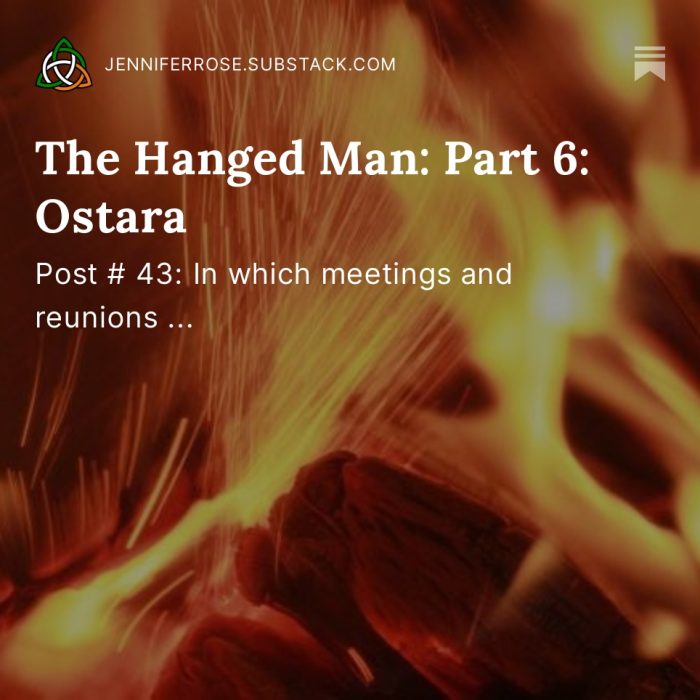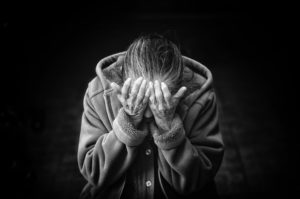by Jenny Rose | Oct 15, 2022 | Emotional Intelligence, Fear, Feelings
One of my favorite filters through which to make choices is the question: Who benefits if I do this? Who benefits if I don’t do this?
It’s a deceptively simple question on the surface. Most of the choices we make in an hour, a day, are unconscious. We don’t take the time to think about them. We go with our instinct or impulse, we take the path of least resistance, we default to our familiar routine, we choose the most comfortable thing. Pausing to think our choices through slows us down and makes us uncomfortable.

Photo by Jonathan Simcoe on Unsplash
Unconsciousness is so much easier!
Last week I wrote about making choices, paths and no-paths, trying to navigate my life journey according to what works best for me, makes me happiest, and creates a life true to my particular values rather than doing what everyone else seems to be doing and following the most trampled trails. You know a lot of trash gets left beside the most heavily used roads, right?
I make many choices out of fear. I suspect we all do, but I won’t presume to speak for anyone but myself. In fact, I’ve posted about fear-driven choices before on this blog, years ago. Interesting, how we can spiral around and around in life, going a little deeper with each iteration.
Let’s take, for an example of a fearful choice, our own personal economic situation, whatever it is. If we are afraid to keep our accounts balanced, budget, open our bills, call a plumber, or commit to some kind of savings account, who benefits? Seriously. It’s a real question. Who benefits when we avoid dealing with our financial situation?
Any lender or business entity who charges interest or late fees benefits. Our bank benefits in overdraft or returned payment charges. Capitalism benefits if we don’t manage our spending habits and can’t resist advertising. Nameless, faceless institutions and corporations benefit from our fear. It’s in their best interests to complicate, obfuscate, create pitfalls and loopholes, offer “deals” and “sales.”
Who benefits when we put off dealing with a frightening physical sign or symptom, or facing an addiction? Both situations have the potential to get much worse, more frightening, more deadly, more expensive. So who benefits when we choose to deny, avoid, ignore what’s happening?
Who benefits when we sabotage ourselves, when we don’t choose to live according to the highest expression of who we are? Who benefits when we silence ourselves or allow others to silence us? Who benefits when we refuse risk, vulnerability, passionate creativity, joy?
I have never made a fear-based choice that didn’t eventually come back around and bite me in the ass. Most of us know the feeling of “what was I thinking?” Making the easiest or most seductive choice in the moment can mean years of cleaning up consequences and eventually having to revisit the original choice point and try again, hopefully with more wisdom.

Photo by Nicole Mason on Unsplash
And if we do circle back around, fear is still there. What if I get it wrong again? What if I fail? What if I can’t do this one thing I want to do more than anything else? What if the other kids laugh at me? What if I miss out on what everyone else is doing? What if this is my last chance?
“What if …” is nearly always the voice of fear, and it frequently stops me in my tracks. I can think of ten ways every choice might be the wrong one. All my demons throw a party and I’m stuck, locked in the bathroom without a friend or a way home while listening to them smash up the furniture..
Why do I make choices that benefit my fear? According to Oxford Online Dictionary, fear is a feeling arising from the belief that someone or something is dangerous, likely to cause pain, or a threat.
A feeling arising from a belief. Contrary to the increasing fanaticism and extremism infecting our culture, a belief is not necessarily true. We can and do change our beliefs.
Belief is a choice.
As for the feeling of fear, we are psychobiologically wired to feel it because it’s a survival mechanism. Our ancestors felt it and effectively responded to it; if they hadn’t, we wouldn’t be here.
Feeling fear is not the tricky part. What we choose to do with the feeling is. Do we use it as the good tool it is, or do we let it stop us, take away our power, keep us imprisoned?
More than that, do we feed it? Do we choose to benefit it?
If we allow our fear to take over our lives, as opposed to harnessing it to keep ourselves whole and healthy, who benefits?
No one and nothing but our fear.
Do we want to benefit a feeling based on a belief?
When I look at the world around me, that seems like a dark, well-trodden path with a lot of trash left beside it. I don’t see that particular path leading to any true connection, opportunity, or healing.
It’s not what I want. It’s not what I choose to do.
There’s enough fear in the world without me adding to it or enabling it, even in my small sphere.
Fear is for taking immediate, life-saving action. Or for weighing the pros and cons of a risky activity or choice. Or for directing our attention to a potential threat, a real threat, like the stranger peering in our window, not a belief.
We can benefit from our appropriate response to fear. Let’s not allow fear, or anyone manufacturing it, to benefit from us.
To read my fiction, serially published free every week, go here. 
.
by Jenny Rose | Jul 16, 2022 | Emotional Intelligence, Feelings, Happiness
Years ago, when I was seeking a divorce, my lawyer asked me one day in the middle of my frustration and fear regarding custody of my boys if I wanted to be right or I wanted to be free.
It was one of the best questions anyone had ever asked me, and I didn’t have to think about my answer.
“Free,” I said. In that moment, I gave up on my rather naïve ideas about justice and cooperation in the process of divorce. I stopped worrying about being right. I understood no one but me was interested in the best situation for the kids. I fought for as much freedom as I could get, not for myself, but for them.
The memory came vividly back to me when I read this article by Arthur Brooks from Big Think. The author describes an interaction with a successful but unhappy financier, who remarks she would rather be special than happy. Her definition of special has to do with professional success. Ordinary people, she says, can be happy. She wants to be more special than that.

Photo by Andrew Loke on Unsplash
I thought about that choice, and I wonder, are special or happy the only two choices? Is there some rule stating one can’t be special and happy?
Why do we believe we have to give up something to be happy?
I’ve written a series of posts about happiness, inspired by the work of Martin Seligman, PhD. I went back and reread those posts.
Can ordinary people be happy but extraordinary people can’t?
Are ordinary people happy?
Is ordinariness shameful? Is happiness a goal only for those who can’t be special in any way, a kind of booby prize?
I don’t believe happiness has anything to do with being ordinary, extraordinary (as defined by whom?) or somewhere in between. It’s a lot more complicated than that. I wonder if we’re losing our ability to distinguish between temporarily satisfying our addictions, expectations, and compulsions while numbing our pain and fear, and feeling true, enduring happiness.
Happiness, after all, is a state of being rather than a state of doing. To some degree we must allow it – give it time, space, and a safe place to exist. It’s not something to pursue or try to create. It’s already within us, somewhere.
(This creation of space, by the way, is a pillar of minimalism. If everything is important, nothing is. One discards until what’s truly important is revealed.)
I jotted down this statement: I’d rather be dutiful, loyal, responsible, a good parent/partner/daughter/sister, rich, powerful, in control, right or successful, than happy. I didn’t think hard about it. I have chosen everything on that list at one time or another in my life. I haven’t chosen happiness or seen it as a choice, and I’ve been unconscious of my belief that happiness can’t coexist with my standards of integrity.
Happiness just doesn’t seem like a worthy goal to me. It’s not culturally sanctioned. Ambition, power, wealth – those are worthy goals. Those are things that matter. Obviously (so obvious it goes without saying directly), those are the roads to happiness. One can be happy, but it must be earned, and happiness is not the goal, just a nice bonus. The real goal is productivity. The shadow side of productivity is consumption.
But productivity is a moving goalpost, and it doesn’t make us happy.
It occurs to me we talk about happiness or unhappiness as a blanket state of being, but it’s really more like Swiss cheese. I feel chronically unhappy about some aspects of my life, and chronically angry about others. Yet every day I also feel periods of happiness when I allow it and take the time to be present in the moment.

When I allow myself to play in the garden, I feel happy.
When I allow myself to settle down with a good book, I feel happy.
When I allow myself to be creative, I feel happy.
When I allow myself to be who I am, I feel happy.
Gardening, reading, being creative, and living authentically take time, intention, discipline, and energy. Discipline. Can you believe it? It takes discipline to remember I’m not a human doing, but a human being. My intrinsic worth as a being isn’t tied to productivity or consumption. The treadmill of productivity is easy. Stepping off and relaxing takes discipline. And that’s not only me.
The nature of addiction (physical and mental dependence) in any form is that it gradually pushes everything else out of our lives. Our addiction consumes our time, energy and money. Anything not in service to the addiction is discarded, including relationships, health, free time, quiet time, and creativity. Our addiction becomes our primary relationship and those around us quickly learn we’re not available for anyone or anything else.
Workaholism and perfectionism are addictions, along with productivity, toxic positivity, substance abuse, eating disorders, over-exercising, and sex addictions.
Happiness is power. That which takes us away from our happiness is disempowering.
Why do we live in, perpetuate, and enable a culture that relentlessly and brutally disconnects us from happiness?
That’s easy. Our individual happiness does not benefit capitalism, because happiness can’t be bought or sold. Capitalism benefits from an unhappy population brainwashed into believing productivity and consumption will make us happy. Who benefits from violence, division, hatred, manipulating our fear, restriction of choice, and disconnecting us from the simple pleasure of happiness?
Those currently in power and determined to stay that way, both governmental and corporate.
Who allows and enables that power-over stranglehold?
We do.
But we could change our minds.

Photo by Cristian Newman on Unsplash
by Jenny Rose | Jun 18, 2022 | Emotional Intelligence, Feelings
Food for thought from Seth Godin: Productivity is not measured in drama.

Photo by roya ann miller on Unsplash
Sometimes life seems to me like a giant factory. The owners are busy manufacturing fear and drama day and night, making money hand over fist. We the people sit in little cubicles, brainwashed and manipulated by the factory owners, responding to fear and drama stimuli for all we’re worth (and much more than we’re worth, monetarily speaking) and providing a gigantic, endless river of profit to the few at the top. After a few months in the factory, we’re promoted; we’ve learned to create fear and drama all by ourselves! Now we can model good business practice for the newbies.
Success!
For someone.
Fear and drama. Two top money-makers. Naturally, a capitalist culture would be constructed to relentlessly promote them, and any vehicle for increasing fear and drama would have enormous lucrative potential. Hence, staggering financial power and influence in the form of social media, conspiracy theory centers and advertising.
Information (facts) and critical thinking mitigate fear, so let’s demonize them and weaken public education so such heretical things are not taught.
Breaking our addiction to stuff and stimulation, instant gratification and validation, might allow us to realize how hollow and expensive those addictions are, so let’s not give people a single second in which to be tranquil and quiet.
Changing our belief that having and doing are more important than being, that doing more faster will lead to greater productivity and thus more money (with which we can buy more) will hurt the economy. Let’s make that unpatriotic, unpopular, and offensive.

Photo by Heidi Sandstrom. on Unsplash
Let’s emphasize and support division, outrage, hatred, bigotry, procrastination, ignorance, catastrophizing, gaslighting, urgency, “alternative facts”, and disempowerment. Let’s prioritize making a profit.
Let’s train the culture to demand drama, and richly reward those who disseminate the most drama to the public. Let’s give those people power, authority, awards, and our money. Let’s give them our time and attention, our applause, loyalty, and praise. They entertain us. They tell us what we want to hear. They will be our saviors in a terrifying world. Without them, we’ll lose everything. (Starting with our guns.)
Manufactured drama. Manufactured fear. As though life doesn’t have enough organically grown drama and fear.
But one can never have enough money, right? And fear and drama are sound investments. Better than blue chip stocks, because they perform best in the worst of times.
At some point, we hitched drama onto productivity and conflated them. Godin reminds us productivity and drama are not the same or even related, unless it’s an inverse relationship.
We don’t have to choose crisis. We can build slack into our lives, quiet, unplugged time, time away from a screen. We don’t have to feed drama or get involved with it. We certainly don’t have to pass it on. We don’t have to attach to fear. We can unhook from fearful media, take our time and attention away from it.
Fear and drama don’t help us effectively manage our lives or make positive contributions. They don’t make us more humane or better problem solvers. They don’t help us find true love or good health. They’re neither creative nor connecting. Urgency is not high-quality fuel for life, and it doesn’t help us make empowered choices.
If we want to be productive, we need to disengage from fear and drama.

Photo by Annie Spratt on Unsplash
by Jenny Rose | Apr 23, 2022 | Emotional Intelligence, Feelings
All my life I’ve been told I overreact and I’m too dramatic, two labels which automatically invalidate my experience, feelings, and any attempt I make to communicate honestly.
Being told we’re overreacting is a sure way to shut us down, especially when we hear it regularly. It makes us question our own experience. It breaks connection and trust. It isolates us in shame.
It’s an insidious form of gaslighting.

Photo by Jonathan Crews on Unsplash
When I went through emotional intelligence coaching, I understood being told I’m dramatic is code for, “Your feelings make me uncomfortable.” It’s not a message about me at all, it’s a message about the person with whom I’m interacting.
As a child, I believed I exaggerated and I was too dramatic. I pushed my feelings down and hid them. I didn’t respond to my own distress. I didn’t ask for help. I trusted no one with my real emotions. I taught myself to become stoic and uncomplaining, to focus on the positive, to carry on no matter what.
My feelings became my enemies. I was deeply ashamed of them. They were bad and wrong and they hurt other people.
Now, decades later, I think a lot about feelings as I struggle with my re-triggered autoimmune disease. I know my current physical pain mirrors my emotional pain, which consists of passionate, intense feelings. Learning to manage those feelings more effectively is a work in progress. I do well with one at a time, but right now I’m overwhelmed with emotion. Emotional overwhelm is the trigger for physical pain. I keep right on keeping on through difficult feelings, but once the anguish is translated into back spasm, I can no longer hide or ignore my pain. Everyone else can see. Everyone else knows. I can’t hide my physical disability.
My body betrays me.
Horrors. I cringe, waiting to be told I’m too dramatic and I overreact. My feelings are wrong. They make others uncomfortable. They’re shameful, immature, crazy. I have nothing to complain about. Others have much harder lives than I do. It’s my business to support, not ask for support.
But my body tells the truth. Physically, everything hurts.
The truth beneath that truth is my heart hurts. I’m scared, I’m angry, I feel alone, I feel supported and horribly vulnerable, I’m excited about new beginnings, I feel guilty and ashamed about struggling, I feel relieved, and I don’t know how to bear my grief, both current and past. But I’m still too distant from my feeling experience to encompass all that, let alone manage it effectively.

Photo by Cristian Newman on Unsplash
So, back pain.
In the middle of this experience, I read an article by Courtney Carver from Be More With Less titled “5 Thoughtful Ways to Help You Underreact.” As you can imagine, it caught my eye.
Every day I think about this list of five strategies, and the difference between overreaction and feelings.
Overreaction is defined as a more emotional response than is warranted. Who decides what kind of an emotional response is warranted? Some people feel things very strongly and vividly; others do not. Certain events and situations trigger deep emotions for all of us. Do any of us have a right to judge another person as overreacting, especially when we can’t possibly know the entirety of their private emotional experience? Certainly, some people appear to overreact frequently, but do we stop to ask ourselves, or them, for more information? What is going on? What is behind the perceived overreaction? What need is crying out to be met? What are the feelings involved in the overreaction?
Feelings are value-neutral raw data we’re all biologically wired to experience. They’re simple. Mad. Sad. Glad. Scared. Ashamed.
We’re largely not in control of the complicated neurological and chemical experience of our feelings. We are able to control how we think about, express, and act out our feelings.
Thoughts and feelings are not the same thing.
I’m familiar with some of the strategies Carver writes about in her piece, but I’ve never seen such a concise and useful list of ways to manage habits of thought leading to “overreaction.”
It’s not our business to be concerned with onlookers who attempt to shut us down because of their own discomfort with feelings. Our business is learning how to refrain from shutting ourselves down or allowing anyone else to do so. Our business is taking care we don’t hurt ourselves as we feel our feelings.
Here’s Carver’s list:
- Do what you can. Let the rest go.
- Determine if any action or reaction is useful or effective in the first place. Does this deserve my time and energy?
- Don’t take anything personally.
- Distinguish between inside and outside. We can’t control what happens outside us. Our power lies within us.
- Closely related to the last strategy, if we feel we’re overreacting, what else is going on? Are we sick, hurt, dealing with unfinished feelings or unhealed wounds, struggling with addiction, lonely, tired, hungry? We need to focus on supporting ourselves.
Some people don’t want to deal with feelings, their own or anyone else’s. I understand. Such people will always struggle with someone like me, who feels deeply and expresses vividly. To them, I will always look as though I’m overreacting.
What overreacting means to me, though, is the intensity of my feelings is negatively affecting my health, and I need to find ways to support myself. I don’t want to feel less. I want to feel better.

Photo by Ben White on Unsplash
by Jenny Rose | Mar 26, 2022 | Emotional Intelligence, Feelings
Courtney Carver from Be More With Less suggests the feeling we call guilt may in fact be discomfort.
What an interesting distinction. I was immediately intrigued.
Guilt is defined as feeling responsible or regretful for a real or perceived offense.
A real or perceived offense.

Photo by Cristian Newman on Unsplash
If you’re someone like me, you feel almost everything you do and say is some kind of a breach of conduct, especially things like saying no, meeting your own needs, and setting boundaries. This feeling is based on past unhappy/critical/invalidating reactions of others to my actions. If I’ve Failed To Please, I feel guilty. I feel guilty even when I know I’ve done the right thing for myself.
So what if that feeling isn’t guilt at all? What if it’s discomfort?
Changing habits is uncomfortable, no doubt about that. Habits are effortless, especially mental and emotional habits. They feel like our friends. They’ve been with us a long time. We’re attached to them because they’re easy and familiar. Whether or not they’re effective or useful is not the point. How they affect others is of no interest.
They’re easy, and they’re ours.
The thing is, our habits don’t belong to us so much as we belong to them. We can stop them any time, we tell ourselves and everyone else. If we wanted to. But we don’t want to.
So there.
Breaking habits takes intention, focus, and determination. Support helps, but sometimes it’s unavailable.
So, do we feel guilty because we’re making different choices than our habits dictate, or do we feel uncomfortable because we’re making different choices? Making different choices affects those around us, and when things start changing, people get uncomfortable, especially if the change wasn’t their idea. Most people are sure to tell us when we “make” them uncomfortable.
Then the guilt starts.
Maybe discomfort, theirs and/or ours, is a good sign, a sign we’re truly doing the work of change. Maybe the guiltier/more uncomfortable we feel, the more successful we are.
Maybe we shelve the guilt and welcome the discomfort.
Sometimes we all do something we know is wrong and guilt helps us learn and make amends for our choices. Sometimes. Not every day, all day.
Being alive, taking up space, growing, learning, and reclaiming our power and health are not worthy of guilt. Uncomfortable work, yes. An offense, a breach of conduct, a crime, no.
When I feel that old familiar guilt come knocking, I’m going to look at it more closely. Maybe it’s not guilt at all. Maybe it’s just discomfort.

Photo by Gary Bendig on Unsplash
by Jenny Rose | Oct 30, 2021 | Emotional Intelligence, Feelings
I lost a friend two weeks ago.
I have, of course, been thinking about her. She was a friend from my past, a part of my past. I had not seen her or even spoken with her in some time, but she remained in my memory as part of the place I called my home before I came here to Maine.

Photo by Andrew Montgomery on Unsplash
Death. The axis around which our lives pivot, and yet what can we say, or think, or even react with that isn’t entirely banal?
Starting, beginning, changing our surroundings and jobs, meeting friends and lovers, having children, reaching milestones, are all obvious, and loud, and exciting. We look ahead to such experiences, strive and work for them.
We forget that all these involve parting, too. Parting can be so quiet, like a canoe sliding from the land into the early mist on the lake. Hardly a ripple. No fanfare. Just floating soundlessly away into the unknown, while we stand on the shore, watching it disappear.
Sometimes we lie asleep in our beds during the moment of parting, oblivious. We rise, and brush our teeth, and make breakfast, watching the mist burn off the water through our kitchen window, and we realize suddenly someone or something has left us. They’re gone. We didn’t know this was the morning. We didn’t say goodbye. The inescapable moment of parting came and went without us.
Then again, parting can be so subtle we don’t recognize it’s begun. Our gaze is ahead, on the next task, the next goal. But behind us, or off to the side, out of our awareness, the time of parting, long or short, is upon us. The flow of connection has turned to an ebb, and, inexorably, we drift apart from what once moored us.
Someone put my friend on PostHope, an online place for people to schedule visits, write messages, and update on a loved one’s condition. She was unable to communicate herself, but PostHope gave us a place to send our love and support to her and follow her progress.
This was a great gift to me, so far away. I snail mailed a card she will never receive. I posted a message. I read all the updates as they came in, and there was reason for optimism, a possibility for at least partial recovery.
Then, in an idle moment I checked my email and found a message that she had died. I felt all the things we do feel in such moments. Disbelief and denial. Grief. A little later, a sorrowful peacefulness, because she would have been unable to live independently after her illness, and she was a fiercely independent woman.

By Vladimir Gladkov on Unsplash
What do we leave behind when we are gone? We talk about legacies, and children, and brilliant achievements of art or science or service, but what do ordinary people leave? My friend had no money. She had no children or close family. She lived alone. She was not famous.
In the days after her death, many posted words of sorrow and comfort on PostHope. I did not. Her place is no longer my place, and I am a different woman than the one who left. Many of her friends were strangers to me, or nothing more than names I remember from my time there. My heart is too full, and I was not ready.
I do not want to talk about her. I want to know she is still there, teaching art to children, taking a spin class, working in the art gallery, painting, dancing, and caring for the homeless cats who came far and wide for food, shelter, and love. I want to know she’s giving massages, making her herbal salves, wildcrafting sage for smudge sticks, and cooking.
But she’s gone now. Her house, which was the house in which I raised my sons before she bought it from me, is empty. She’ll never paint another picture or make another jar of salve.
I did not know, the last time I saw her and said good-bye, that it was forever. I still have a picture of that evening, but it’s color on a flat sheet of paper, and unsatisfying.
My memories are better. I still smile when I remember how we danced together, whooping and laughing, and how she tore off her shirt and danced in her sports bra as we gave ourselves to the music and our blood ran swift and hot.
I remember, too, how fascinated I was with her authenticity. She liked to talk. She was loud, and opinionated, and without tact. Her blunt honesty made people around her squirm sometimes. As a lifelong people pleaser, peacemaker, and soft-spoken fawner, she appalled me frequently, but she also amused and amazed me. How could anyone risk being so real? She taught me about living unapologetically true to oneself.
My friend had a big, soft, generous heart. She was a woman who loved and worked tirelessly for the community. That community will be less vital, less challenging, less interesting, and quieter without her.
Death is banal. But life isn’t. Hers was a beautiful life. She gave what she had to give without counting the cost. She loved. She lived without holding anything back. Now we have parted. She’s gone into the mist, beyond my sight.
Good-bye, my dear friend.

Photo by Erik Stine on Unsplash















